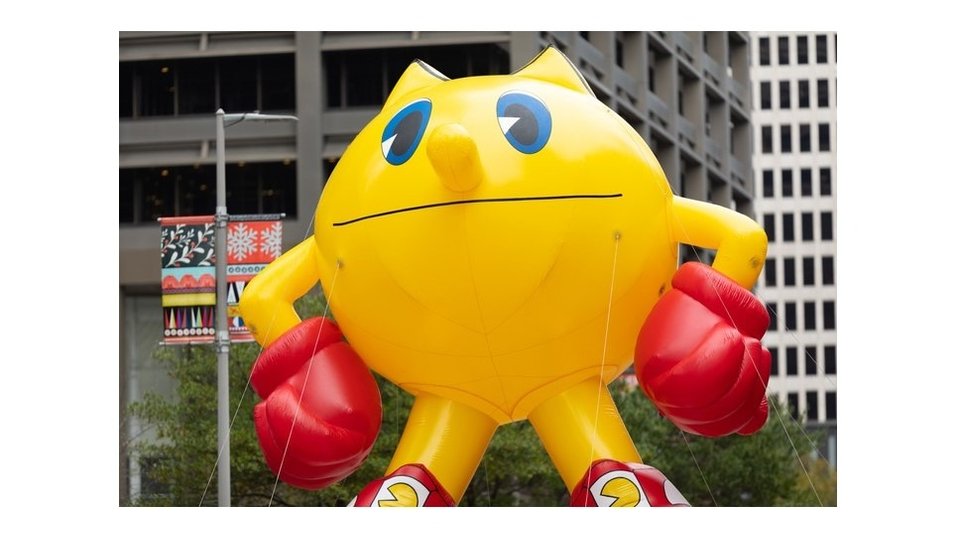Commentary
Licensing industry recharges location based entertainment
Licensing properties have reinvested in location based entertaiment as younger consumers embrace immersive experiences.

August 29, 2022 by Kevin Williams
The deployment of intellectual properties and branding into the location-based entertainment and themed attraction scene has been a long and fruitful partnership.
Recently, the licensing trade has placed more interest in all things LBE, resulting from studies that report younger consumers placing a priority on experiences, and this is also being reflected from purchasing habits of older consumers.
Dave & Buster's signaled a major investment in licensing properties with plans to install, across a selection of its venues, a VR simulator experience on its developer hardware. The "Top Gun: Marverick" VR experience uses the motion-platform and HTC Vive Pro platform that has been used for several other licensed film VR experiences.
This latest development, in partnership with Paramount Pictures, offers four riders the chance to find themselves in the danger zone, sitting in the cockpit of their fighter jet and taking on hordes of enemy fighters.
Developed to coincide with the release of the blockbuster sequel movie, this is an example, as with previous licensed properties, of the importance that LBE offers the licensing industry.
A bump in the road
But the volatile nature of the out-of-home entertainment scene surfaced when Vending Times broke news that TouchTunes and AMI Entertainment had suspended exploring merger agreements. After several weeks of initial research, the U.S. government requested more review than the parties had expected, possibly taking up to 18 months. Both parties decided to end the merger exploration and continue as separate companies.
It was not a surprise that these negotiations would have issues, compounded by complicated licensing deals and access to licensed content — the lifeblood of this business.
The digital online music scene has been in flux since the early 2000s as the sector attempted to include streamed music, video and game content.
Investment continues
Brand and intellectual property investment in OOH nonetheless continues.
Hasbro celebrated the opening of the first Nerf Action Xperience facility. While its VR amusement from Meta4 Interactive, with its Hasbro Transformers VR: Battle Arena platform promotes the franchise's latest movie outing.
The toymaker boasts an extensive background in touring attraction and live experiences, best illustrated in London with "Monopoly: Life-Size" and the extensive work with the movie and toy Transformers IP seen in attractions, amusement and VR experiences licensed from the corporation.
Mattel and Epic Resort Destinations announced that Mattel Adventure Park in Glendale, Arizona will open in 2023 and incorporate brands ranging from Barbie to Hot Wheels. The venue will be an important flagship entertainment site for the brand's continued investment into location-based entertainment and will include attractions such as the "Barbie flying theater," along with laser tag arenas and even mini-golf courses, all branded with Mattel IP.
Crayola flagged its location-based entertainment credentials with its "Crayola Imagine Arts Experience" — acting as children's exhibitions and summer camps for guests to be immersed in the product range from the corporation.
Iconic brands
Some brands seem eternal, with the celebration of the 120th anniversary of the Peter Rabbit property, and it was announced that Histrionic Productions will launch a live immersive experience based on the character to open in 2023 at Blenheim Palace.
Called the "Peter Rabbit Garden Adventure," and developed under license from Penguin Ventures, the experience will go on tour across the U.K. — along with other characters from the Beatrix Potter properties.
This children's book character accelerated to stardom with a modern audience through engagement via a successful motion picture franchise.
Brands embrace immersive tech
Falcon's Beyond Global recently presented three examples of its immersive technology to show the levels of engagement achievable for the modern brand.
The first was seen with the "SpectraVerse" — an immersive projection enclosure that also tracks the guests' movements for both the ability to perspective-match the visuals to match the guest's field of view, and secondly to allow them to interact with physical items with the virtual world projected. The system was developed for both a single environment narrative as well as a free-walking version for larger engagement.
Falcon's Beyond also introduced its "Onix" — a 5D theater incorporating physical effects, motion seating and interactive narrative control from the audience. The system creates a multiplayer video game experience in real-time.
The final new technology for audience engagement revealed by the company was its "Falcon's Vision" — an augmented reality headset developed for deployment in high throughput locations, being durable and reliable for the needs of AR based attractions. The system has been developed to support a 120 framerate, along with localized audio support and even haptic feedback built-in.
While consumer applications of AR still look to find their feet, AR in theme park and attractions has already been established, as seen with the Super Nintendo World "Mario Kart" attraction.
Unis Technology has embraced licensing for several releases, and recently launched "BigFoot Crush" — a "kidtainment" scaled amusement piece based on the monster truck BigFoot, licensed for the project.
Speaking of monsters, Field Entertainment partnered with DOF Robotics on the "Monster Jam: Grave Digger" VR simulator experience allowing guests to go for a ride in the full motion simulator, wearing VR headsets and experiencing the thrills of the Monster Jam.
The Pac-Man legacy
An older video game legend marked its 42nd anniversary recently. Pac-Man received a dedicated museum web page charting its history through amusement, videogame and merchandising from Bandai Namco, but also received some very interesting historical airbrushing in the process.
The need to manage a brand with such a long and convoluted history as Pac-Man is an obvious nightmare. Set aside the final acceptance of the original Puck-Man name legacy, and the variances of character IP during the Midway years, there are other issues that plague the historical record of this most iconic of video game mascots.
More recently, it was reported that while the titular hero's wife, Ms. Pac-Man, was to be welcomed to the World Video Game Hall of Fame, Bandai Namco was embroiled in a legal dispute regarding the continued representation of the character — this has seen the fabrication of Pac-Mum!, which has appeared in the remastered version of Pac-Land in a consumer game anthology.
The ownership of the game Ms. Pac-Man is a long and torturous tale, developed not by Namco but by General Computer Corp. for U.S. distributor Midway in 1982 — and has been embroiled in legal actions over the years.
During 2022, the appearance of the redesigned Pac-Mom was a continuance of that dispute, now with AtGames which had acquired the GCC royalty rights. None of the parties were willing to answer questions from the media when this substitution was discovered by a keen-eyed gamer.
The shadows of the dispute still linger. There is no word on whether games that include an appearance from the character's spouse will also have to receive the same treatment, if remastered.
The Bandai Namco Museum web page charting Pac-Man's history also had several "redactions" of games that saw the yellow mascot's appearance.
One of the most notorious is a title that has become a footnote in the iconic character legacy, the 1996 release "Pac-Man VR" — one of the last full amusement releases by the ill-fated VR pioneer Virtuality and its 2000SU hardware.
This marked the first but not the last entry of the character into virtual reality. Directly licensed from Namco, which partnered in the design of what would be the 10th amusement outing at that point for the mascot, the game saw a limited launch before Virtuality's ignominious shuttering.
A more recent jump into immersive entertainment for the pill gobbler saw the short-lived "Pac In Town," AR attraction in 2018 that Bandai Namco developed for its VR Zone facility concept. This was a version of the classic maze game, rendered as an AR experience, using the Microsoft Hololens.
The developers would also dabble with VR once again, launching "VR Pac-Man Challenge PV" — a two-player virtual representation of the classic game, this time developed for the Oculus Quest VR headsets, in a short-lived partnership, and installed as an attraction in the VR Zone and Mazaria sites.
These games will be sidelined from the history books, associated with the failed virtual reality amusement site rollout plans from the corporation, all part of the "Project-i-Can" initiative that was brushed under the corporate carpet.
Most recently, Pac-Man has returned to Western amusement with Bandai Namco's launch of "Pac-Man Battle Royale Chompionship" — building off the original battle royale release, the new game includes a larger playing experience and an increased number of competitors.
In a unique move, BNAA also developed a smartphone powered version of the game, having players control their characters on screen without the need for amusement cabinet hardware.
This is a nod to the deployment of the game as a social entertainment experience in the hospitality scene, truly illustrating the value and importance of an iconic brand, even if not all its outings strike gold.
The importance of the licensing and intellectual property sectors' association with the theme park and location-based entertainment sector cannot be understated.
(Editor's note: Extracts from this blog are from recent coverage in The Stinger Report, published by Spider Entertainment and its director, Kevin Williams, the leading interactive out-of-home entertainment news service covering the immersive frontier and beyond.)
About Kevin Williams
Along with advisory positions with other entrants into the market he is founder and publisher of the Stinger Report, “a-must-read” e-zine for those working or investing in the amusement, attractions and entertainment industry. He is a prolific writer and provides regular news columns for main trade publications. He also travels the globe as a keynote speaker, moderator and panelist at numerous industry conferences and events. Author of “The Out-of-Home Immersive Entertainment Frontier: Expanding Interactive Boundaries in Leisure Facilities,” the only book on this aspect of the market, with the second edition scheduled for a 2023 release.
 ChatGPT
ChatGPT Grok
Grok Perplexity
Perplexity Claude
Claude






